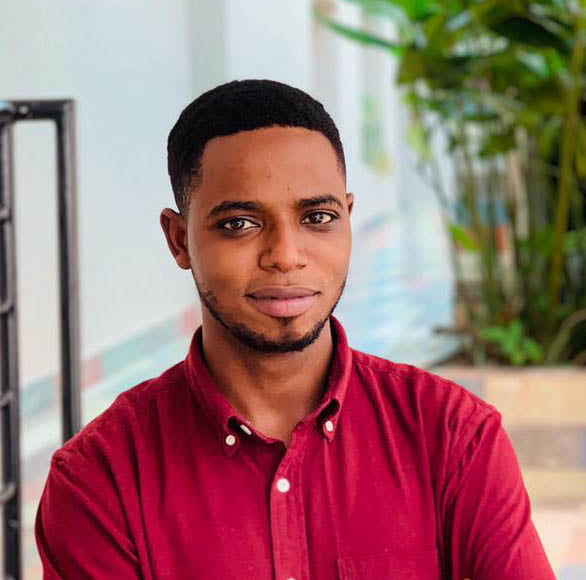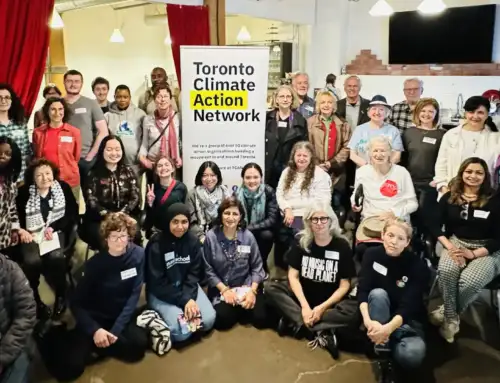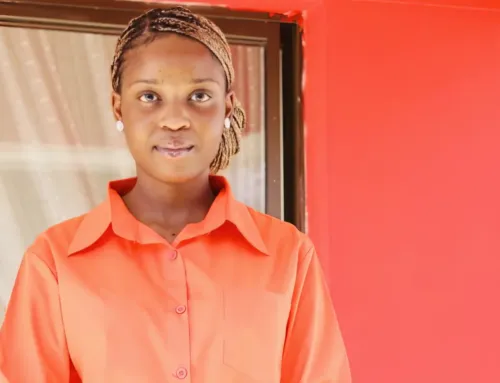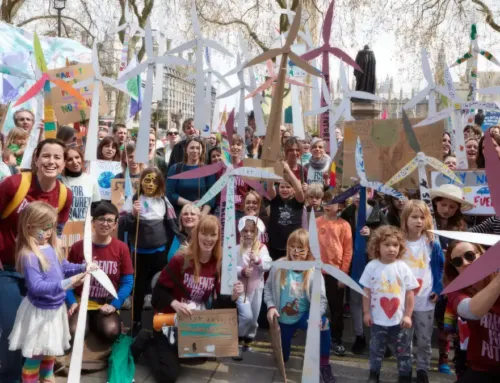STORIES
Aphrodice Nshimiyimana: “We need a collective effort on climate that will last from generation to generation” – intergenerational climate action in Rwanda
Aphrodice Nshimiyimana is an environmental communicator based in Rwanda. He facilitates climate action and environmental conservation work in grassroots communities. He has established a network of parents, teachers, and caregivers in Rwanda who are working across generations with children to share climate knowledge and push for a brighter future. In this piece he shares how climate change impacted his community growing up, and why he thinks engaging the younger generation is key to unlocking climate action.
My motivation to act on climate comes from my childhood history. I was born and grew up in a rural area, in the Southern Province of Rwanda. My family and I were affected by droughts and floods in Rwanda, caused by climate change, although at the time we didn’t know the cause of such calamities.
To this day, a huge number of people in my community are still facing these challenges. My motivation to work on climate comes from the desire to bring solutions and change the situation for my community, and other communities in Rwanda.
When I was a young adolescent, around ten-years-old, we faced a very strange sunny period that lasted around three years without any agricultural harvest. I remember how the community suffered with hunger. It was and still is a rural community with small holder farmers dependent on rainfall to water their crops. In our village, the agricultural harvest brings us everything we need: food, health insurance, school uniforms, school fees, and all other household expenses. Children dropped out of school and were affected by malnutrition.
I remember it like it happened yesterday. I could hear the Elders saying “God’s punishments have come upon us.” To them droughts, farming seasons change, heavy and violent rain among others were all from God. We grew up believing in that, and I think the same thinking is still there for a big number of people; many elders and youth have never had a chance to pursue their education to the secondary level and learn about climate change.
Later our problems were worsened by the introduction of a terracing project in the community, which left all trees including banana and coffee trees on the hillside cut down. The landscape was very clear with laid terraces from one mountain to another. This is when the heavy rain and wind came and blew-up everything including the roofs of houses. It destroyed the terraces.
This period I was in my first year of university, studying journalism and communication. Of all the modules and lessons in the school of journalism and communication, advocacy and being the voice of the voiceless was my take home from campus life. When I started doing freelance journalism, I joined Rwanda Environmental Journalists Network, by that time I had started understanding a little the concept of climate change and the hand we as human beings have in worsening it.
Through the Environmental Journalist Network, I came to join a locally based non-governmental organization, The Global initiative for Environment and Reconciliation (GER-Rwanda). This was my starting point. I began to explore people’s climate change experience globally and was able to read more about the realities of climate change, including testimonies similar to the stories of my own childhood community. I learnt about measures that can be undertaken by communities – people themselves – to mitigate and adapt to the effects of climate change. This was the moment I started to realize that I could do something and bring changes to my community.
I identified a knowledge gap between generations. Even though our parents and grandparents did not go to school, they had indigenous knowledge about the coexistence of human wellbeing and nature. They knew how to keep their farm and home eco friendly and climate resilient. They knew that some trees were meant to live with people, in the homestead, yard, and in the farms. The younger generation needs to know and sustain this. We need to reconnect generations and keep that circle of knowledge.
Today I take action through intergenerational climate work. I facilitate discussions between parents, teachers, caregivers, guardians and children. I start conversations on climate at schools, home, church and elsewhere parents and children can interact. I talk about how we can mitigate the impact of climate change and I involve both generations in physical climate action.
Engaging the younger generation means that generation will be empowered and involved in the process of driving changes and striving for ecosystem restoration. It will help us ensure a collective effort on climate that will last from generation to generation.
For example last year, I worked with Cyumba Primary and Secondary school in Nyabihu District of the Northern Province of Rwanda. I brought together 50 children, three teachers and three parent representatives. We shared climate knowledge and experience, with the children learning from parents and teachers. We discussed the effects of waste burning at home and school, deforestation and the role of tree planting, as well as children’s capacity to plant and care for trees. We initiated a one tree per child action where we provided fruit tree saplings and children planted 50 fruit trees in the school yard. Each child also took one fruit tree sapling home for the initiative to be extended at home.
We are planning to strengthen our work through ongoing climate clubs in 30 primary and secondary schools in Rwanda. We hope these clubs will reach a wide community audience as we will be planning actions to be replicated inside and outside schools. These clubs will be a good platform to share children’s concerns about climate change and to educate them about their roles in improving the situation in the future with actions taken today.
If nothing is done, life is expected to get hard especially for us from small and middle-income African countries which are highly vulnerable to the impacts of climate change. I worry about what the increasing exploitation of fossil fuels and continued deforestation globally could mean for our futures.
But I am relieved by seeing a wide network of concerned people like us, and those who are pushing to enforce policies and treaties that different governments have signed. Signing them is one thing and putting them in action is another thing, and I know the harder we push the better decisions can be made. If we keep pushing and educating the younger generation, I hope to see everyone – of all ages – taking responsibility for conservation, climate and our planet.




